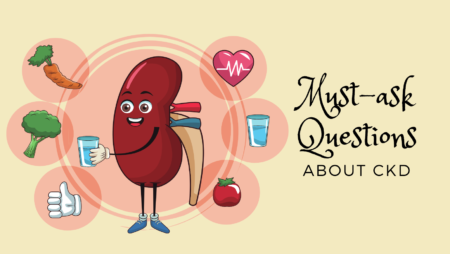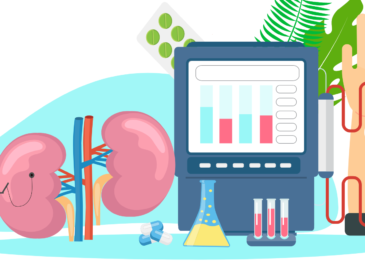Chronic kidney disease (CKD) is lifelong and progresses slowly. Slowing disease progression is essential. If you have been diagnosed with CKD, it is important to ask your doctors the right questions about CKD to understand the condition and how to manage it.
What is CKD?
CKD is a loss of kidney function that has lasted for at least 3 months. More than 800 million people worldwide are estimated to have the disease.
Early stages of CKD may not have any noticeable symptoms, and many people are unaware that they have the condition. But, as the disease progresses, symptoms may include fatigue, nausea, swelling, and changes in urination patterns.
Is it important to ask about CKD?
Chronic Kidney Disease is a complex condition that requires careful management. Many factors can contribute to the development and progression of CKD. Because of the complexity of the disease, it is important to ask your doctor questions to ensure that you are receiving the best possible care.
Most patients who come to my clinic ask me what caused the kidney damage. But you should ask a lot more than that. Asking questions can help you better understand your condition and treatment options. It can also help you make informed decisions about your health.
Here are a few reasons why it is important to ask questions:
- You will better understand your diagnosis and treatment options.
- It can help you identify potential complications and side effects of treatment.
- It can help you recognize complications of the disease.
- It motivates you to take an active role in your care.
- It enables you make informed decisions about your health.
You can also help your doctor better understand your needs and concerns by asking questions. This will lead to a more personalized and effective treatment. So don’t be afraid to ask questions or bring up any concerns you may have. Your doctor is there to help you and wants to ensure that you receive the best possible care.
Some patients have reported not knowing what questions to ask. Here are 5 simple questions about CKD to ask your doctor.
Question 1: What caused my CKD?
Several conditions cause CKD. Identifying the exact cause of your CKD can help in your treatment. This is because treating the underlying cause can slow or stop further damage. If your CKD is caused by diabetes mellitus, then getting your blood sugar under control is crucial. If your CKD is caused by hypertension, you should take blood pressure medications to get it in check.
Here are some causes of CKD
- Hypertension
- Diabetes mellitus
- Glomerulonephritis
- Infections
- Drugs
- Genetic diseases
Question 2: What stage of CKD am I in?
One of the most important questions to ask about CKD is what stage of the disease you are in. This information is critical in determining the appropriate treatment plan and monitoring the progression of the disease.
The National Kidney Foundation (NKF) has established a five-stage classification system for CKD based on the level of kidney function measured by the estimated glomerular filtration rate (eGFR). Your doctor will use this classification system to determine what stage of CKD you are in.
The five stages of CKD are:
| Stage | eGFR | Description |
| 1 | >= 90 | Normal or high kidney function but urine findings or structural abnormalities or genetic trait point to kidney disease |
| 2 | 60-89 | Mildly reduced kidney function and other findings (as for stage 1) point to kidney disease |
| 3a | 45-59 | Mildly to moderately reduced kidney function |
| 3b | 30-44 | Moderately to severely reduced kidney function |
| 4 | 15-29 | Severely reduced kidney function |
| 5 | <15 | Kidney failure (or end-stage renal disease). |
It is important to note that not all patients go through all stages of CKD. Some patients may remain in the early stages of the disease for years, while others may progress more rapidly.
Knowing what stage of CKD you are in can help you and your doctor make informed decisions about your treatment plan and lifestyle changes that may help slow the progression of the disease.
For example, if you are in the later stages of the disease, you will have more dietary restrictions than someone in the early stages. Furthermore, certain complications like anemia are more common in later stages.
Question 3: What tests will I need?
Testing is an essential part of managing chronic kidney disease (CKD). Your doctor will order specific tests to monitor your kidney function and help determine the best treatment for you.
Your doctor will also need tests to determine the underlying cause of CKD and the presence of complications. Although all patients with CKD require tests, some tests may be unique to specific groups of patients. A person with lupus, for example, may be asked to check for complement levels.
Here are some tests you may be asked to do.
- Blood tests: Your doctor will order blood tests to check your kidney function. These tests measure the levels of waste products in your blood, such as creatinine and urea. Your doctor may also order blood tests to check your electrolyte levels, such as potassium and sodium.
- Urine tests: Urine tests can help your doctor determine how well your kidneys are working. These tests measure the amount of protein, blood and other substances in your urine.
- Imaging tests: Your doctor may order imaging tests, such as an ultrasound, CT scan, or MRI, to get a better look at your kidneys and urinary tract.
- Biopsy: In some cases, your doctor may recommend a kidney biopsy to help determine the cause of your CKD. Not all patients who have CKD will need a biopsy.
In the course of follow-up, some investigations will be requested repeatedly. It’s important to follow your doctor’s testing recommendations and keep track of your results. Regular testing can help you and your doctor monitor your kidney function and make any necessary adjustments to your treatment plan.
When your test results are available, don’t forget to ask for the results and their implication.
Question 4: What are my treatment options?
Once diagnosed with CKD, your doctor will discuss various treatment options. Your treatment type will depend on your CKD stage, overall health, and other factors.
Here are some common treatment options:
- Lifestyle changes: Your doctor may recommend changes to your diet, exercise routine, and other lifestyle habits to help manage your CKD.
- Medications: Depending on the stage of your CKD, your doctor may prescribe medications to control your blood pressure, manage your blood sugar levels, or treat other conditions contributing to your CKD. You should also ask about possible side effects of any medications prescribed.
- Dialysis: If your CKD has progressed to a severe stage, your doctor may recommend dialysis. Dialysis is a treatment that filters your blood to remove waste and excess fluid from your body.
- Kidney transplant: If your CKD has progressed to end-stage renal disease (ESRD), your doctor may recommend a kidney transplant. A kidney transplant is a surgical procedure in which a healthy kidney is transplanted into your body to replace your damaged kidney.
It’s important to discuss all of your treatment options with your doctor to determine the best course of action for your individual needs. Your doctor can provide you with more information about each treatment option, including the risks and benefits.
Question 5: What are my next steps?
Depending on your stage of kidney disease, your doctor will tell you about self-care tips and how to monitor the disease.
You should look out for symptoms and signs of kidney disease. New symptoms may indicate disease progression. Some symptoms of kidney disease are
- Changes in appetite and taste
- Increased fatigue and weakness
- Trouble sleeping
- Fluid retention and swelling in the legs and feet
- Increased need to urinate, especially at night
- Itching and dry skin
- Difficulty concentrating and memory problems
You may also discuss your work and hobbies to see if there are changes you need to make. Your doctor will advise you about steps to help slow or reverse the disease.
For people in the late stages, your next steps may include a plan for dialysis or transplant.
Bottom-line
Although a diagnosis of CKD is overwhelming, asking questions can help you understand your condition and treatment options. Don’t hesitate to ask questions and take charge of your health.
Disclaimer
This content is for educational purposes only. Discuss your health concerns with your healthcare team




